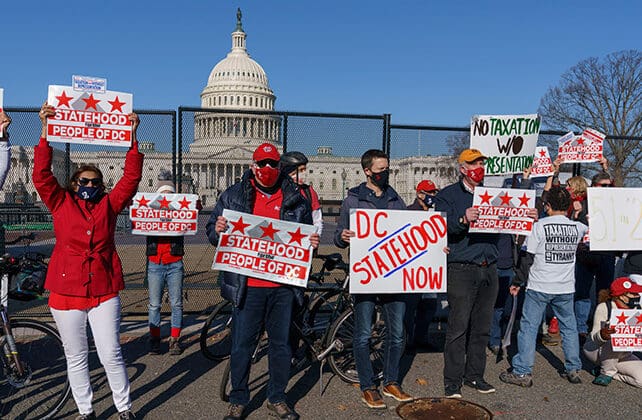
WASHINGTON (RNS) More than 300 faith leaders and heads of prominent religious organizations signed a letter sent to Senate leadership on Tuesday (June 22) backing the call to make Washington, D.C., a state, adding religious support to the growing Democratic-led effort.
“As clergy and faith leaders from across our nation, we write to express our strong support for granting the 700,000 residents of Washington, D.C. full equality in our nation,” the letter read. “Voting and representation is a sacred right that should not be denied. We support D.C. statehood, a cause that is aligned with our country’s highest values, and we urge a swift hearing for and passage of S. 51, the Washington, D.C. Admission Act.”
The letter came the same day lawmakers convened the first Senate hearing since 2014 to examine the possibility of making a large portion of the nation’s capital the 51st state. Mayor Muriel E. Bowser testified at the nearly three-hour hearing and later tweeted an image of herself being sworn in with the caption: “Prayerfully, I will be the last DC mayor who needs to demand what is our birthright, and what is owed to us as taxpayers—full citizenship and full democracy.”
Statehood legislation already passed the House of Representatives in April but faces long odds in the Senate: It has yet to secure support from all Democrats and will likely require the elimination of the filibuster to pass — something Democratic Sens. Joe Manchin III of West Virginia and Kyrsten Sinema of Arizona have said they oppose.
Even so, faith leaders argued in their letter the vote should only require a simple majority “as has been the case for 37 states in our nation’s history.” They noted Washington is home to more residents than Vermont or Wyoming and pointed out that “police officers who defended the Capitol during the January 6th insurrection have no representation in the Congress that they risked their lives to protect.”
D.C.’s lack of voting representation in Congress is “sadly rooted in racial discrimination,” they argued, insisting “the historical record is replete with those who opposed voting rights for D.C. residents for explicitly racial reasons.”
The letter cast statehood as a matter of faith, quoting late Georgia congressman and civil rights icon John Lewis: “The civil rights movement was based on faith.”
“As faith leaders, we will stand, speak, and protest against the disenfranchisement of the residents of D.C.,” the letter read.
One of the letter’s more notable signers is James Winkler, head of the National Council of Churches. The NCC is a historic organization that “unifies a diverse covenant community of 38 member communions” representing about 40 million people and includes a wide array of faith groups such as the African Methodist Episcopal Church, Episcopal Church, Evangelical Lutheran Church in America, Presbyterian Church (USA), Progressive National Baptist Convention and various Orthodox traditions, among others.
Other national-level signers included Sandra Sorensen, director of the United Church of Christ’s Washington office; Sheila Katz, head of the National Council of Jewish Women; Pablo DeJesus, executive director of Unitarian Universalists for Social Justice; Marie Dennis, senior adviser to the secretary-general of Pax Christi International; and Diane Randall, head of the Friends Committee on National Legislation.
Organizers of the effort noted signers hailed from 35 states and a variety of faiths, but many call Washington home, such as Pastor Patricia Fears of Fellowship Baptist Church; Pastor Donald Isaac of Southeast Tabernacle Baptist Church; Pastor Reginald Farmer of True Gospel Tabernacle Baptist Church; the Rev. Ben Roberts of Foundry United Methodist Church; and the Rev. Gini Gerbasi of St. John’s Church in Georgetown, who was among the demonstrators forcibly expelled from the similarly named St. John’s church in downtown D.C. just before then-President Donald Trump’s Bible photo op in June 2020.
Some, such as Fears, have already spoken out in favor of D.C. statehood, a cause often cited as part of a growing voting rights agenda championed by a variety of faith groups — especially Black church leaders.
